On October 6-7, 2021, SSP held a 2-day virtual seminar, “New Directions in Scholarly Publishing: How to Move Fast and Not Break Things: Balancing High-Speed Outputs at the Risk of Slamming on the Brakes,” and I had the pleasure of attending a few of the engaging sessions. I appreciated that this event discussed recent challenges, such as those introduced during the pandemic, but it also recognized the long-standing discussions and changes the industry is currently engaging with such as reviewer burnout, embracing digital spaces, and how to appropriately use journal metrics. While the sessions acknowledged the fast pace at which scholarly publishing moves, a lot of the perspectives and speakers rightly took a step back to also remind those tuning in that some conversations are older than we think and that we still have time to take forward exciting ideas and solutions. You can now view these sessions at your convenience in SSP’s OnDemand Video Content Library.
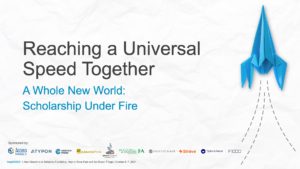 The first session, “A Whole New World: Scholarship Under Fire,” addressed the responsibilities we have as a collective of publishers and researchers to help address society’s most pressing issues. Dr. Chhavi Chauhan from the American Society of Investigative Pathology moderated the session and opened with a beautiful Sanskrit phrase that translates to “the whole world is my home”, an idea that feels more relevant than ever as the whole world has grappled with the public health crisis of Covid-19 and the climate crisis. Rachel Martin of Elsevier and Toby Green of Coherent Digital joined Dr. Chauhan as panelists and the three discussed how we can build trust in science, better communicate impactful research to the public, and move the needle forward with policy.
The first session, “A Whole New World: Scholarship Under Fire,” addressed the responsibilities we have as a collective of publishers and researchers to help address society’s most pressing issues. Dr. Chhavi Chauhan from the American Society of Investigative Pathology moderated the session and opened with a beautiful Sanskrit phrase that translates to “the whole world is my home”, an idea that feels more relevant than ever as the whole world has grappled with the public health crisis of Covid-19 and the climate crisis. Rachel Martin of Elsevier and Toby Green of Coherent Digital joined Dr. Chauhan as panelists and the three discussed how we can build trust in science, better communicate impactful research to the public, and move the needle forward with policy.
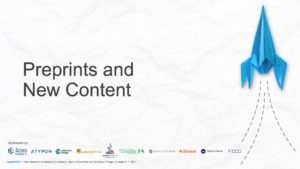 In “Preprints and New Content,” Sylvia Izzo Hunter of Inera, moderated while Michele Avissar-Whiting of Research Square Company, Joy Owango of Training Centre in Communication and AfricArxiv, and Alex Freeman of Octopus challenged the notion that preprints are a new idea and, like the first session, discussed how building trust is necessary to create sustainability because the demand for rapid access to knowledge will continue. As more publishers accept preprints and absorb this process into the standard journal workflow, they asked, “How can we pause and reflect on how we can make this system work and leverage all the internet has to offer?”
In “Preprints and New Content,” Sylvia Izzo Hunter of Inera, moderated while Michele Avissar-Whiting of Research Square Company, Joy Owango of Training Centre in Communication and AfricArxiv, and Alex Freeman of Octopus challenged the notion that preprints are a new idea and, like the first session, discussed how building trust is necessary to create sustainability because the demand for rapid access to knowledge will continue. As more publishers accept preprints and absorb this process into the standard journal workflow, they asked, “How can we pause and reflect on how we can make this system work and leverage all the internet has to offer?”
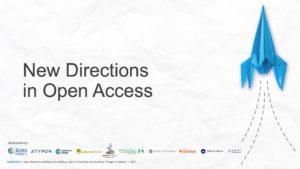 “New Directions in Open Access“ was a session that also examined how books and journals can leverage digital spaces in a unique and interactive format that allowed panelists to interview each other before coming together at the end for a larger discussion. Speakers included Raym Crow of SPARC and Chain Bridge Group, Dr. Kamran Naim of CERN, John Sherer from UNC Press, Susan Doerr from the University of Minnesota Press, Dr. Martin Paul Eve from Birkbeck, University of London, and Sara Rouhi of PLOS. Heather Staines of Delta Think Inc moderated. How do publishers of different sizes and scales invest in the digital space and accessibility in an “era of hybridity” and engage with non-traditional formats to make sure researchers are appropriately credited? How do we move past rhetoric of support of open access and channel it in effective ways that acknowledge fixed costs? This session explored these tough questions and additional “spicy takes” on where we are as an industry regarding open access.
“New Directions in Open Access“ was a session that also examined how books and journals can leverage digital spaces in a unique and interactive format that allowed panelists to interview each other before coming together at the end for a larger discussion. Speakers included Raym Crow of SPARC and Chain Bridge Group, Dr. Kamran Naim of CERN, John Sherer from UNC Press, Susan Doerr from the University of Minnesota Press, Dr. Martin Paul Eve from Birkbeck, University of London, and Sara Rouhi of PLOS. Heather Staines of Delta Think Inc moderated. How do publishers of different sizes and scales invest in the digital space and accessibility in an “era of hybridity” and engage with non-traditional formats to make sure researchers are appropriately credited? How do we move past rhetoric of support of open access and channel it in effective ways that acknowledge fixed costs? This session explored these tough questions and additional “spicy takes” on where we are as an industry regarding open access.
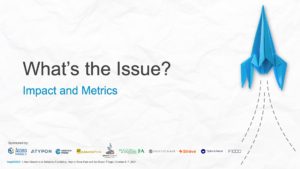 “What’s the Issue? Impact and Metrics” was moderated by Sai Konda of ACS. He was joined by panelists, Rebecca Kennison from K|N Consultants, Marie McVeigh of Clarivate Analytics, and Josh Nicholson from scite. The main takeaway of this session was the idea of context and thinking about how citation indexing is a way to show how a paper contextualizes itself at a specific point in time while showing how the conversation evolved after it was published. Focusing on impact factors or only looking at one piece of data takes away from this nuance, especially as there are many vital parts of a discussion including data, blogs, social media, etc. that don’t go on to be cited. There’s a lot of work that still needs to be done regarding best practices within academia and how to continue to preserve the scholarly record at scale. This fascinating session explored all of this and more.
“What’s the Issue? Impact and Metrics” was moderated by Sai Konda of ACS. He was joined by panelists, Rebecca Kennison from K|N Consultants, Marie McVeigh of Clarivate Analytics, and Josh Nicholson from scite. The main takeaway of this session was the idea of context and thinking about how citation indexing is a way to show how a paper contextualizes itself at a specific point in time while showing how the conversation evolved after it was published. Focusing on impact factors or only looking at one piece of data takes away from this nuance, especially as there are many vital parts of a discussion including data, blogs, social media, etc. that don’t go on to be cited. There’s a lot of work that still needs to be done regarding best practices within academia and how to continue to preserve the scholarly record at scale. This fascinating session explored all of this and more.
This is only a peek into a few of the sessions during the seminar as there are others that discuss funding and discoverability. The conversations asked practical questions while not shying away from theorizing and imagining exciting new ways of embracing change.
News contribution by SSP member, Ande Nichols. Ande is a publisher within the Health & Medical Sciences team at Elsevier.

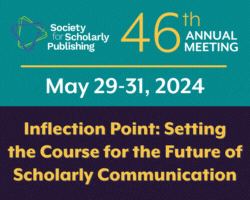

Join the Conversation
You must be logged in to post a comment.